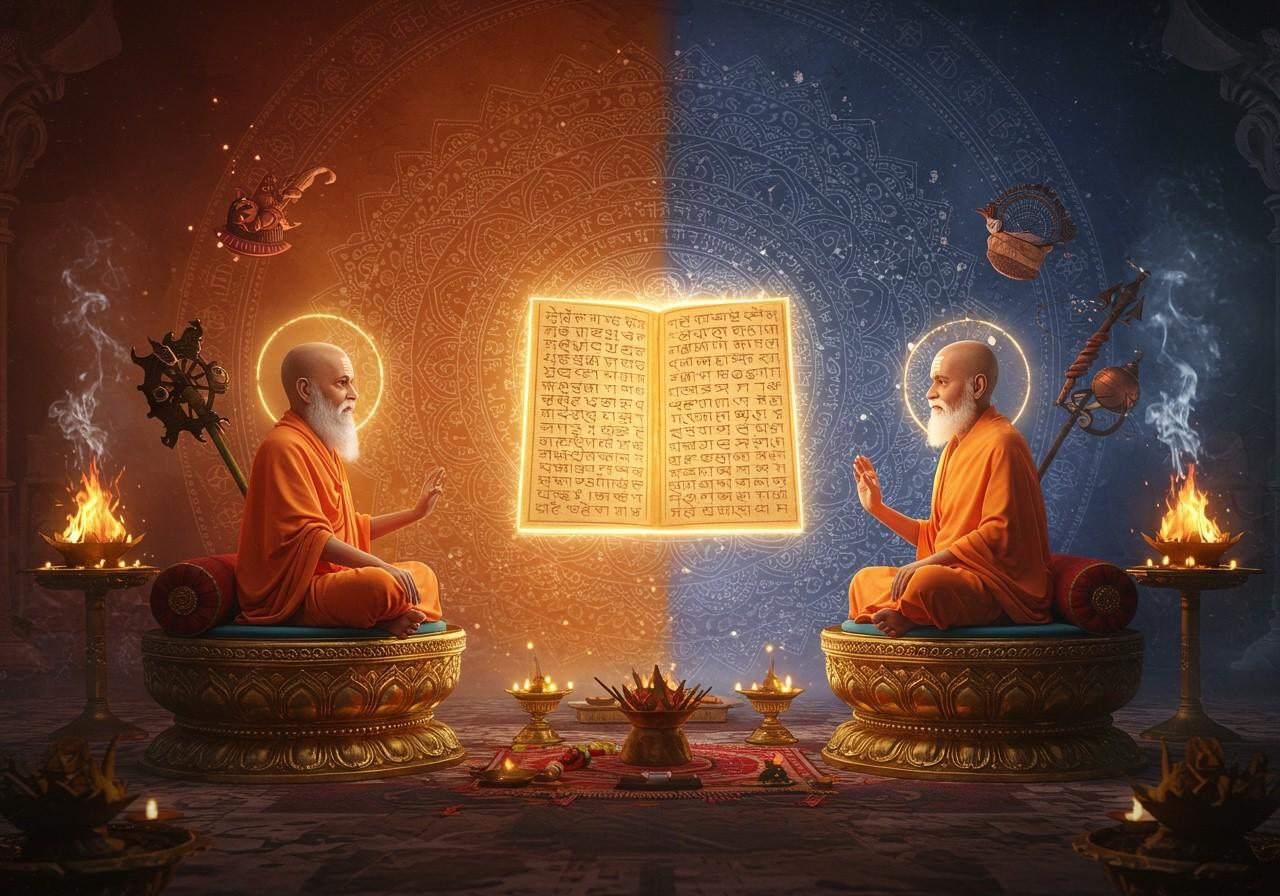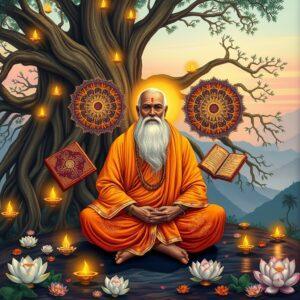
This blog post delves into the significant philosophical contributions of Kumārila Bhaṭṭa and Prabhākara, two prominent figures in the Mīmāṃsā school of Indian philosophy. This exploration of their perspectives helps us appreciate the nuances of Indian thought and the development of complex philosophical discussions within the tradition.
Background of Mīmāṃsā Philosophy
Mīmāṃsā, meaning ‘reflection’ or ‘critical investigation’, is one of the six orthodox schools of Hindu philosophy. It primarily focuses on interpreting the Vedas, emphasizing the performance of Vedic rituals, and understanding dharma (duty). The school is divided into two main branches: Bhāṭṭa Mīmāṃsā, founded by Kumārila Bhaṭṭa, and Prābhākara Mīmāṃsā, founded by Prabhākara. Understanding these foundational principles and their historical context is crucial for comprehending the philosophies of these two influential thinkers.
Kumārila Bhaṭṭa’s Philosophy
Kumārila Bhaṭṭa, renowned for his works like Tantravārttika and Ślokavārttika, viewed dharma as a timeless and universal principle. He considered the Vedas infallible and self-evident, introducing the concept of svataḥ prāmāṇya (self-evident validity), particularly concerning Vedic teachings. Kumārila Bhaṭṭa also engaged in critiques of Buddhist philosophy, staunchly defending Vedic rituals and traditions.
You can further explore the concept of dharma with our insightful blog post: Hindu Philosophy Explained: A Beginner’s Guide.
Prabhākara’s Philosophy
Prabhākara, another key figure in Mīmāṃsā, presented a unique approach to Vedic interpretation. His theory of pramāṇa (means of knowledge) diverged from Kumārila’s. Prabhākara emphasized kriyā (action) as central to understanding dharma and explored the concepts of svārtha (self-interest) and pārārtha (interest of others) within Vedic rituals. Rejecting svataḥ prāmāṇya, he stressed the importance of human perception and inference in acquiring knowledge. His work significantly contributed to the development of logical methods in Indian philosophy.
Delve deeper into the rich traditions of Hindu rituals with our blog post: Sacred Offerings in Hindu Rituals: Their Importance and Meaning.
Comparative Analysis
Comparing Kumārila Bhaṭṭa and Prabhākara reveals key differences in their interpretations of the Vedas and dharma. Their views on the validity and authority of Vedic texts diverged significantly. Moreover, their epistemological approaches, particularly concerning pramāṇa, also varied.
Kumārila Bhaṭṭa recognized six pramāṇas: perception, inference, comparison, verbal testimony, postulation, and non-apprehension. Prabhākara, conversely, rejected non-apprehension as a valid source of knowledge, arguing that negation cannot stand alone as an independent pramāṇa. These differing views are central to understanding their distinct philosophical positions.
Learn more about the fascinating geography of the Ramayana, which is closely tied to Vedic traditions, in our blog post: Ayodhya and Lanka: Ramayana Geography Explained.
These philosophical differences shaped their understanding of Jaimini’s sutras. Kumārila’s acceptance of multiple pramāṇas provided a broader framework for Vedic interpretation, while Prabhākara’s focus on perception and inference led to a more action-oriented approach to dharma. Their debates shaped the Mīmāṃsā school and influenced subsequent philosophers. Kumārila’s followers further developed his ideas, producing significant commentaries and works that enriched Indian philosophical thought.
How Poojn.in Supports Your Vedic Studies and Rituals
Poojn.in offers a wide selection of items essential for both scholars and practitioners engaged in the study of Mīmāṃsā philosophy and the performance of related rituals. The philosophical works of Kumārila Bhaṭṭa and Prabhākara underscore the importance of proper Vedic rituals and their correct interpretation. Poojn.in provides high-quality products to support these practices.
- Pure copper and brass items for ritual offerings: Poojn.in offers a wide variety of authentic copper and brass items, essential for performing traditional Vedic rituals. These items are crafted with precision and care, ensuring they meet the highest standards of purity and quality. They are ideal for offerings during pujas and ceremonies.
- Traditional dhoop and agarbatti for ritual ceremonies: Enhance your ritual experience with our selection of traditional dhoop and agarbatti. These aromatic offerings create a sacred atmosphere conducive to prayer and meditation, adding a deeper dimension to your Vedic practices.
- Authentic Vedic texts and study materials: Deepen your understanding of Mīmāṃsā and other Vedic philosophies with our collection of authentic texts and study materials. We offer a curated selection of books and resources to support your scholarly pursuits.
- Specialized puja samagri sets for Vedic rituals: Simplify your ritual preparations with our specialized puja samagri sets. These sets contain all the essential items required for specific Vedic rituals, ensuring you have everything you need at your fingertips.
- Pure ghee for havan and yajna ceremonies: Poojn.in provides pure ghee, a crucial element in havan and yajna ceremonies. Our ghee is sourced from trusted suppliers and is guaranteed to be of the highest quality, ensuring the sanctity of your rituals.
These items are carefully selected to support proper ritual performance as described in Mīmāṃsā texts. Poojn.in is committed to ensuring the authenticity and quality of all its ritual items, aligning with the stringent standards of Vedic traditions. Visit www.poojn.in to explore our complete collection of ritual items and Vedic supplies. All products are carefully sourced and verified for purity and authenticity, making them suitable for scholarly and ritual purposes. You can find specific products such as camphor, murtis, and agarbatti for your rituals.
Conclusion
Kumārila Bhaṭṭa and Prabhākara remain towering figures in Mīmāṃsā philosophy. Their unique perspectives on the Vedas and dharma have profoundly shaped Hindu thought. Kumārila emphasized the eternal and infallible nature of the Vedas, while Prabhākara focused on the significance of human perception and action. Their contrasting views on pramāṇa and Vedic interpretation showcase the richness and diversity within the Mīmāṃsā school. Understanding their philosophies provides valuable insights into the depth of Hindu traditions and the crucial role of critical investigation in upholding these rituals. Their contributions continue to resonate, offering wisdom for those exploring India’s spiritual and intellectual heritage.
Frequently Asked Questions about Kumārila Bhaṭṭa and Prabhākara
What is Mīmāṃsā philosophy? Mīmāṃsā is a school of Indian philosophy primarily concerned with interpreting Vedic texts and understanding the principles of dharma through the performance of rituals.
Who are Kumārila Bhaṭṭa and Prabhākara? Kumārila Bhaṭṭa and Prabhākara are two highly influential scholars within the Mīmāṃsā school, each establishing distinct branches of thought within the tradition.
What are their main differences? Kumārila Bhaṭṭa championed the self-evident validity of the Vedas and recognized six pramāṇas, while Prabhākara emphasized perception and inference, accepting only five pramāṇas. These differing epistemological stances shaped their interpretations of Vedic injunctions and the concept of dharma.
What is Kumārila Bhaṭṭa’s view on Vedic rituals? Kumārila Bhaṭṭa believed that Vedic rituals are essential for achieving spiritual merit and upholding cosmic order. He emphasized the importance of precise performance and understanding the underlying meaning of these rituals.
What is Prabhākara’s view on the validity of Vedic texts? Prabhākara argued that the validity of Vedic texts lies in their inherent authority and the efficacy of the actions they prescribe. He placed less emphasis on the metaphysical aspects and focused on the practical implications of Vedic teachings.


